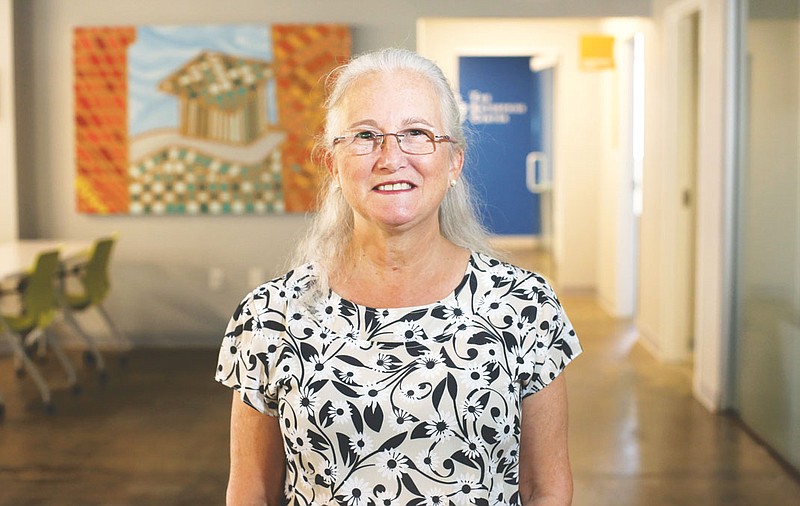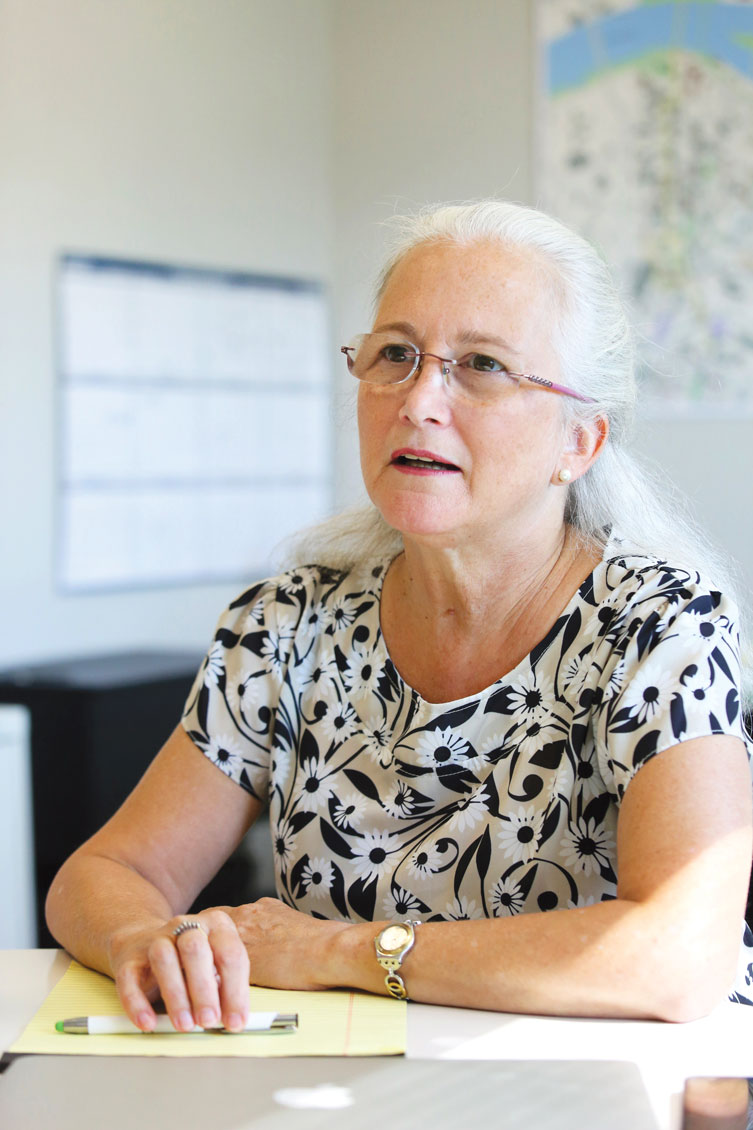Deb Socia says she loved being a middle school math teacher in Boston, but with an entrepreneurial passion she soon moved into leadership roles in education to help empower her fellow teachers and the inner-city students she taught.
"I never planned to be a principal, but I became one because I got tired of people telling me no and I wanted to be a principal who said yes - yes we can try something new," she recalls. "When people talk about entrepreneurs we forget that educators can be entrepreneurs too and startups are startups regardless of where they are starting."
Socia, who went on to lead citywide and national programs to promote computer technology and literacy, came to Chattanooga this summer to lead the city's innovation development agency, The Enterprise Center.
Socia, who succeeded the retiring Ken Hays as head of the city-backed Enterprise Center, is the fourth CEO of the nonprofit agency since former Mayor Bob Corker established the center in 2002 to promote innovation and technology in Chattanooga. The effort was propelled in 2010 when EPB began offering America's first citywide gigabit-per-second internet service and the center began working to attract Gig users and encourage startups interested in using high-speed broadband.
"People all over the country are jealous of what Chattanooga has," says Socia, who spent the past five years promoting community efforts to expand high-speed internet access and close the digital divide between broadband users and those unable to get or afford broadband services. "I have always been very impressed with what Chattanooga was able to achieve and that is one of the reasons that I decided to come here."
Prior to joining the Enterprise Center, Socia headed a national fight for expanded broadband coverage at Next Century Cities in Washington, D.C., which expanded on her Tech Goes Home efforts in Boston designed to expand access to broadband technology to more communities. With more than 200 city members, Next Century Cities helps celebrate city successes and elevate the importance of next generation broadband as essential infrastructure.
In that role, Socia was repeatedly drawn to Chattanooga and she says she was anxious to cap her career by working again on local issues in a particular community.
"Chattanooga truly is unique in the collaboration among different organizations and people to work together to solve problems," she says. "I know there are challenges here, but this is a city that isn't afraid to face those challenges and then try to find a way to solve them."
About Deb Socia
* Job: President and CEO of The Enterprise Center* Career: A Boston native, Socia was a middle school math teacher, who was named dean of curriculum at Cambridge Rindge Latin School in 1999, founding principal of the Lilla G. Frederick Middle School in Boston in 2003, founding executive director of Tech Goes Home in Boston in 2010, board member of Project Right Inc. in 2013, executive director of Next Century Cities in Washington, D.C., in 2014 and CEO of The Enterprise Center in Chattanooga in July* Education: She earned a master’s degree in education from Lesley University in Cambridge, Massachusetts* Boards: She is a director for the Alliance for Inclusion and Prevention, and The Nonprofit Technology Network* Personal: She and her husband live in Highland Park
From her Boston experience, Socia helped bring Tech Goes Home to Chattanooga four years ago to help train students, parents and others how to get and use computers. The Chattanooga Tech Goes Home - one of five such programs in the country - has worked with schools, churches, nonprofits and the Public Library to provide training and computer access to hundreds of low-income Chattanoogans and others previously unfamiliar with how to work on a computer.
For all of Chattanooga's accolades as America's first Gig City, in some neighborhoods, as few as one in five households have an internet connection.
When the Enterprise Center began looking for a new director to help address that concern and to promote the city's high-speed broadband, Socia was an obvious choice.
"Deb has worked to advance digital equity across the country, and she is known as a national leader on bringing internet accessibility to more Americans," says David Belitz, a partner in the Chattanooga Renaissance Fund and chairman of the Enterprise Center board which selected Socia for the job this spring. "The unfortunate "digital divide" that can exist within cities like ours keeps some neighborhoods and families from reaching their full potential, and that holds us all back."
The Enterprise Center's mission has evolved over time since Corker established the agency to help Chattanooga gain a bigger stake in the. Tennessee Valley Technology Corrridor from Oak Ridge and Knoxville, where the Department of Energy and the University of Tennessee have major research operations, south to Huntsville, Alabama, where NASA maintains its rocket-building facilities and the U.S. Army maintains the Redstone Arsenal. The Enterprise Center has worked in the past to promote a high-speed rail link between Chattanooga and Atlanta and to recruit and develop companies in the Innovation District eager to use EPB's high-speed internet service in the "Gig City."
Chattanooga Mayor Andy Berke created the Innovation District five years ago and has charged the Enterprise Center with its promotion and development through R&D initiates. But Berke also has emphasized the need to make sure that digital advances help everyone in the community and don't crowd out those now living downtown.
"As Chattanooga continues to develop our innovation economy, we could not have found someone more qualified than Deb Socia to build on our momentum and to make sure equity is central to our work," Berke said when Socia was chosen for the job earlier this year.
Socia says her career path has reflected her ongoing desire to bridge the digital divide.
In 2013, she helped launch the Lilla G. Frederick Middle School in Boston - the first inner-city school to open in Boston since busing began in 1974. The 670-student school is located in a gang-ridden area in the Dorchester neighborhood of Boston where 30% of the students have special needs, and nine in 10 are considered low income. By 2007, Socia initiated a program to give each student a laptop and integrate the technology into instruction in a meaningful way. At any given time, about one-third of the classrooms are engaged in some technology-related activities.
"Technology is a real differentiator," Socia says. "It is a way of teaching and learning that we know children need today and I did not want my children to have any less resources than children in other communities."
Socia says the laptops "made a huge difference" in her school and ultimately across Boston and, contrary to conventional wisdom, the devices in the school actually encouraged more student interactions rather than isolate individuals in their own digital world.
"Students worked really well collaboratively because the tool allows that and that is what we encouraged," she says.
The school taught not only students but their parents how to use computers, since many had never previously had access to any type of computer. The school's success led to a citywide program for Boston and the basis of a national Tech Goes Home program.
Socia was been the recipient of many awards for her work, including the NATOA Community Broadband Hero, the Pathfinder Award from MassCUE, the CRSTE Leadership and Vision Award, the Google Digital Inclusion Champion Award, Motherboard Human of the Year, an NTENny Award, and the Charles Benton Digital Equity Award.
In her first few weeks in Chattanooga, Socia said she has quickly grown to love her new adopted hometown. But as she has throughout her career, Socia says she is eager to ensure all Chattanoogans share in the success of the revitalized downtown and Gig economy.
"Our job is to make sure people know and can access what is available here to improve Chattanooga for all people," she says.
The Enterprise Center
* Started: Established in 2002 by Mayor Bob Corker to promote technology, innovation and plans for a high-speed train between Chattanooga and Atlanta * Budget: $1.6 million from the city of Chattanooga, private foundations and other grants and program fees * Mission: "Establishing Chattanooga as a hub of innovation and improving people's lives by leveraging the city's digital technology to create, demonstrate, test, and apply solutions for the 21st century" * Key programs: Co.Lab., Tech Goes Home, Smart Cities Collaborative, Innovation District, Gig City promotion * Governance: A 17-member board, chaired by David Belitz, oversees the agency run by CEO Deb Socia * Headquarters: 5th floor of the Edney Building downtown Source: The Enterprise Center, 2017 IRS form 990

